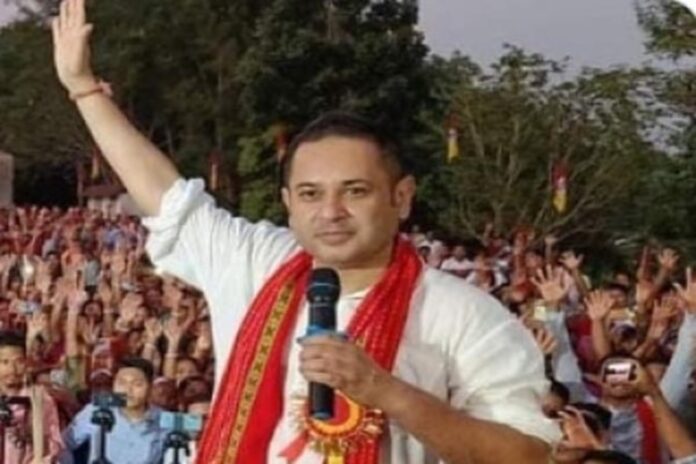In a significant development, Pradyot Bikram Manikya Deb Barman, the chief of Tipra Motha Party (TMP), has announced the launch of an agitation in support of constitutional solutions to address the issues faced by the tribal population in Tripura. Deb Barman, a former royal scion of Tripura, emphasized that his fight is not for personal gain but to secure the future of the backward tribals in the state.
In a video message, Deb Barman highlighted his commitment to the cause, stating that he had sold his royal properties in Kolkata to fund the organization of agitations. He expressed his reluctance to seek any government position, underscoring his sole objective of achieving a constitutional resolution for the tribal problems in Tripura.
However, Deb Barman also acknowledged the internal challenges within his own party, revealing that some TMP leaders are considering joining the Bharatiya Janata Party (BJP) for personal gains. He cautioned them against complaining about the deprivations they might face if they decide to switch parties.
The TMP chief expressed disappointment over the lack of progress on the promises made by Union Home Minister Amit Shah and Assam Chief Minister Himanta Biswa Sarma regarding the appointment of an interlocutor and granting greater autonomy to the tribals. Despite several assurances, months had passed without any substantial actions taken in this regard, he lamented.
Deb Barman criticized Tripura Chief Minister Manik Saha and other BJP leaders for failing to provide adequate funds to the Tripura Tribal Areas Autonomous District Council (TTAADC), thereby depriving the constitutional body of its rightful resources. This action undermined the autonomy and development prospects of the council, he argued.
The TMP had raised its concerns with the government through various channels. A notification by the Tripura government had scheduled a visit by the Centre’s advisor on northeast affairs, Akshay Kumar Mishra, to discuss the issues raised by the party on May 12. However, Mishra did not show up, leaving the TMP further disillusioned.
It is worth noting that in March, Deb Barman had threatened to go on an indefinite hunger strike if the central government failed to address the party’s demands by March 27. Subsequently, the TMP leaders met with Assam Chief Minister Sarma in Guwahati on March 29, hoping for progress on their demands.
Chief Minister Sarma, when questioned about Deb Barman’s announcement of launching a stir, declined to comment on the matter. This response added to the uncertainty surrounding the tribal issues and the government’s stance on resolving them.
The TMP, after its victory in the politically significant TTAADC in April 2021, has been advocating for the elevation of the autonomous body, seeking the establishment of a ‘Greater Tipraland State’ or a separate state status under Articles 2 and 3 of the Constitution. However, the demands of the party have faced strong opposition from the ruling BJP, CPI-M led Left parties, Congress, and the Trinamool Congress.
During the Tripura assembly polls held in February, the TMP fielded 42 candidates, with 20 running for tribal reserved seats. The party secured 13 seats and obtained 19.69 percent of the votes, emerging as the second-largest single party after the BJP, which won 32 seats and formed the government for a second consecutive term.
In the lead-up to the Tripura Assembly Speaker election on March 24, Deb Barman disclosed that Union Home Minister Amit Shah had informed him about the Centre’s intention to appoint an interlocutor by March 27. The interlocutor would assess the constitutional solutions proposed by the TMP, focusing on providing greater autonomy and socio-economic development for the tribal population, which constitutes one-third of Tripura’s 4 million people.
To secure tribal votes, the BJP, considering their significance, urged the TMP leaders to join the BJP-led ministry and reserved three ministerial berths for the tribal party. This move highlighted the political implications and the efforts made to address the concerns raised by the TMP.
As the TMP launches its agitation, Tripura finds itself at a crucial juncture in addressing the grievances of the tribal population. The outcomes of the agitation and the government’s response will play a significant role in shaping the future of tribal rights and autonomy in the state.




